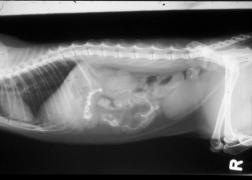Household Cleaning Products: A Pet Danger

Household Cleaning Products: A Pet Danger
It’s spring cleaning time, but if you have pets please clean cautiously since some of the most common cleaning agents can be toxic to your pet. Birds are especially sensitive to the fumes from household cleaning agents.
Chlorine bleach has an extremely wide spectrum of activity against common bacteria and viruses. Its low cost makes bleach an attractive disinfectant and laundry additive. Bleach disinfects by oxidizing cell membranes, rupturing and killing cells. Bleach has the same effect on the gastrointestinal tract if your pet drinks undiluted bleach or chews on the bleach container. A splash of bleach into the eye of a curious pet can cause tearing, irritation and even an ulcer.
Some websites recommend the use of phenol-containing pine scented cleaners as a deterrent for cats who urinate outside their litter boxes. If you use these products, you may no longer have a healthy cat and the litter box issues will seem insignificant. When walking across your freshly mopped kitchen floor, your cats get phenol on their feet. Phenol is caustic to the delicate paw pads. Then, when cats groom, they ingest the cleaner which damages their liver and kidneys. When compared to dogs, cats are extremely susceptible to phenol toxicity since their liver lacks an important enzyme for metabolism of phenol.
Although not technically toxic, steel wool and metal mesh scouring pads can cause intestinal obstruction if consumed by your pet. At first glance these products do not have much culinary appeal, but when encrusted with steak bits from the grill or some scrambled eggs from the frying pan, a scouring pad becomes a tasty treat for your dog or cat. As you can see in the x-ray, the scouring pad unravels and prevents food from normally passing though the intestine. The sharp strands can also slice into the intestinal wall. Emergency surgery is required for removal.
Quaternary ammonium compounds are disinfectants with a broad spectrum of antimicrobial activity against bacteria, viruses and fungus. These compounds are popular cleaning agents colloquially called “quats.” Serious injury can result to both pets and people if they inadvertently come in contact with quats. Caustic burns, convulsions, low blood pressure and even death occur following ingestion or contact with the skin.
The AMC Emergency and Critical Care staff recently teamed up to save the life of a young Yorkshire Terrier with severe oral swelling and respiratory distress from ingestion of quaternary ammonium. Read his story: Yorkie Ingests Deadly Poison and Survives.
Not sure if a product is pet-safe? Download the material safety data sheet for any product you might purchase to prevent bringing a dangerous product home.

































